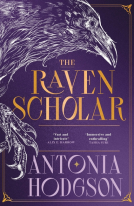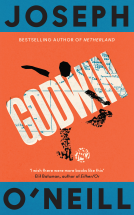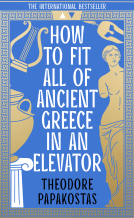
The Penelopiad
by Margaret Atwood
This title was previously available on NetGalley and is now archived.
Send NetGalley books directly to your Kindle or Kindle app
1
To read on a Kindle or Kindle app, please add kindle@netgalley.com as an approved email address to receive files in your Amazon account. Click here for step-by-step instructions.
2
Also find your Kindle email address within your Amazon account, and enter it here.
Pub Date 5 Apr 2018 | Archive Date 5 Apr 2018
Canongate Books | Canongate Canons
Talking about this book? Use #ThePenelopiad #NetGalley. More hashtag tips!
Description
Penelope. Immortalised in legend and myth as the devoted wife of the glorious Odysseus, silently weaving and unpicking and weaving again as she waits for her husband's return.
Now Penelope wanders the underworld, spinning a different kind of thread: her own side of the story - a tale of lust, greed and murder.
Available Editions
| EDITION | Paperback |
| ISBN | 9781786892485 |
| PRICE | £8.99 (GBP) |
Featured Reviews
The first Greek myth I was ever aware of was The Odyssey - aged seven, I went on a long car journey with some family friends who had it on an audiobook. Having come in halfway through, I remember sitting in a kind of confused rapture as I heard about the sirens and Circe and the crew turned into pigs. Penelope was only ever an extremely marginal character, barely considered while the action was actually going on and only important as an end goal. The archetypal dutiful wife, Penelope sat at home patiently waiting twenty years for her husband to return, running the kingdom, fending off suitors, sewing, and weeping, weeping and weeping. On its publication, many hailed The Penelopiad as a feminist retelling of Penelope's story, but Atwood herself objected, pointing out that granting a voice to someone long unheard does not need to be an inherently feminist act. Still, in casting light on the tale of the One Who Stayed At Home, The Penelopiad does have a somewhat subversive feel - when Odysseus came home and cleared his home of all the suitors, he also hanged all twelve of his wife's maid - just what exactly had the ever dutiful Penelope been up to?
Speaking from the afterlife as she wafts through a twenty-first century Hades, Penelope recalls her early family life in Sparta. With a detached kind of puzzlement, she details how her father was so very kind aside from the time he tried to drown her, moving on to her adolescence when Odysseus was able to trick his way into gaining her hand. Penelope was pleased with him, although her glamourous cousin Helen made fun of his comparative poverty and lack of height. Going against tradition, Penelope is taken back to her husband's kingdom of Ithaca upon her marriage where she finds herself ignored and patronised by both her mother-in-law Anticleia and Odysseus' old nurse Eurycleia. Still, she finds happiness in the birth of her son Telemachus - until of course Helen ruins everything.
There is a distinctly theatrical feel to this novel - very fitting of a story that is quite literally a Greek tragedy. Alternating chapters have the chorus of Penelope's twelve slain handmaidens speaking in verse, and then Penelope's own monologues to the reader would also not be out of place onstage. It did not surprise me to discover that such adaptations had indeed taken place - somehow I would imagine this being more effective than any attempt to take it onscreen. Not only are there numerous meta-fictional scenes featuring the maids but a major theme is about the unreliability of memory and the narrators themselves. Penelope is aware that her husband was a trickster and that little of what he said could be trusted and she has her own views on what he has been doing while ostensibly making his way home. She has had to play a dangerous double game to keep ahead of the suitors and manage the maids and has had to lie even to those close to her. As they speak in their chorus, the maids disagree with some of what is said and refuse to forgive Penelope for her complicity in their deaths. What is the truth of what has happened? Presenting this onscreen would lose the ambiguity. This is a story best fit for the theatre.
Like so much of Atwood's fiction, Penelope's main source of tension is with another woman - even in death, she is bitterly jealous of Helen, who wafts through the afterlife with a cluster of admirers still chasing after her. It is interesting that Atwood has chosen to reanimate Penelope - one would think that femme fatale Helen or bloodthirsty Clytemnestra would be more appealing - even melodramatic Cassandra. Penelope is the one who stayed home, the epitome of modesty, keeping the home fires burning, yet even this most domestic of women but Atwood makes it clear that her adventure has been no less than that of her husband. She has told no fewer lies than he, been no less deceitful or manipulative - far from being the saintly wife, Penelope is gossipy and spiteful, calling Helen 'poison on legs' and muttering snide asides. From the afterlife, she tells Helen that modern theories have it that the Trojan War was in fact over trade routes, while Helen snaps back that she should have gotten over her jealousy by now. Yet Penelope's sorrow for the deaths of her maids and her constant pursuit of them across the afterlife, desperate to make amends, seems genuine.
A significant theme of the novel - novella? - is that of justice. The maids point out that they were the lowest of the low, that they had nobody to speak for them and that men did what they would. At one point, Atwood even conjures up a courtroom scene where the maids put their killers on trial. Penelope's defence is questionable. They haunt Penelope and Odysseus across Hades, their deaths are something of which the great man can never cleanse himself, repeatedly fleeing his wife to be free of them. We sense Atwood's sympathy for what the lives of their real-life counterparts must have been - raped with or without their master's permission, disrespected, slaves all their lives, and then murdered. But yet, there still remains the suspicion over what was at the truth of matters. Emphasising that mythology was passed on via oral tradition and that definitive answers are impossible to find, Atwood has clearly done her research, never quite making explicit whether or not Penelope was unfaithful, or what was in the truth of her heart.
But some of the theories which flutter past within The Penelopiad are fascinating. The dream Penelope had immediately before her husband's return, of the white geese being slaughtered, Atwood suggests that in fact her forboding was for her maids rather than the suitors. There is even the theory that the twelve maids represented a lunar cult, with Penelope at its head. Yet, the notion of the women as a feminist sisterhood rings false - the maids do not trust Penelope - Atwood is always suspicious of females in her work and this is no different. So much of the action of The Penelopiad mirrors what has happened within The Odyssey. Odysseus was never a conventional hero, relying on trickery rather than physical courage. Penelope was no less typical a heroine and may indeed have been more culpable than she admits here, but her story is well worth the hearing and the pondering. A mixture of poetic and playful but with shades of the piteous, The Penelopiad is a modern myth to remember.
 Liesl R, Librarian
Liesl R, Librarian
A beautiful reflection on Penelope's story. I came away not knowing quite who to believe: was Penelope as faithful as they say? Was her story the 'true' telling of events? After all, she says her and Odysseus are both liars. The glimpses of Penelope's time in the underworld were particularly poignant. I also loved the nods to Greek Drama with the action interposed with the dead maids as a Greek chorus.
 Sid N, Reviewer
Sid N, Reviewer
I thought The Penelopiad was very good. I approached it with some trepidation, but it was readable, insightful and very funny in places.
This is the myth of Odysseus's wife, narrated by her shade in Hades in the present day. As you'd expect, it has Margaret Atwood's wry, intelligent feminist take on the story. Penelope has rather an ironic, world-weary voice which does become very funny in places. I could almost imagine her doing a stand-up routine about this, and it makes the book very readable, while making some very serious points. Atwood is very good at highlighting the role and mythologizing of the perfect wife for the male fantasy it is, but this is also concerned with class. She is very concerned with the fate of the twelve serving maids who were hanged on Odysseus's return for consorting with Penelope's suitors. They were "just" low-born or slave women who didn't really count for anything and they are neatly brought to life as the Chorus who periodically comment on the story in the manner of Greek tragedy. It's a clever device which makes the points about male hypocrisy and the story's disdain for ordinary lives very well.
I found the actual verse of the Chorus a bit mixed; some was very good, some less successful, but overall this is a readable and thoughtful book which I can recommend.
(My thanks to Canongate for an ARC via NetGalley.)
A short book, this is smart, funny and subversively clever as Atwood re-opens Homer's poems, especially The Odyssey, to give us a Penelope who speaks across time from a classical underworld but with a 21st century voice and hindsight to tell her own story.
At the disturbing heart of this tale is the hanging of the twelve maids after Odysseus kills the suitors: a minor incident in Homer, but one which expands in Atwood's hands to speak volumes about class, gender, violence. But what's most interesting is not just the commentary on possessive masculinity where women and slaves are owned, but the unwitting complicity of Penelope in this act. Through her silence, through her deliberate withholding of information in her own struggle for power and control in the household, she becomes complicit in this act of violent retribution, one which haunts her eternally.
Despite this sombre event, so much of the text is lit with a sceptical, sharp, self-deprecating humour, partly in Penelope's own voice ('the best that was claimed of Menelaus, once they started putting him into the poems, was that he had a very loud voice', p.32) but also in the dazzling array of modes taken by the chorus of hanged maids: they sing, they recite, they act out a trial scene, they play with old-school musicals, and they threaten. Most pressingly, at the end, they become a voice for voiceless women across history who have been raped, coerced, violated and murdered - but it's not a voice of victimhood but of revenge: We're the serving girls, we're here to serve you. We're here to serve you right - the maids perform a version of the Erinyes.
As with her more recent Hag-Seed: The Tempest Retold, Atwood wears her scholarship lightly as she accommodates a multiplicity of versions of Penelope's story, taking account of interpretations from the anthropological (e.g. in Graves' The Greek Myths) to both traditional and modern feminist scholarly readings. For all that, this is a lively, energetic enterprise - if you know Homer and the other sources for this story well then it slightly slows down in the middle but overall this is a darkly humorous take on the sources, that seizes on the residual subversion that is already implicit in Homer and expands it into something transgressive and self-aware.
The Penelopiad is Margaret Atwood’s retelling of the story of Penelope, the famously patient wife of Odysseus. She takes elements of Homer’s Odyssey and other versions of Penelope’s story and new perspectives on these myths and weaving them together in a way fitting for Penelope and her infamous weaving and unpicking to create a tale of sex, violence, lies, and mistakes.
This is a rich, enjoyable retelling that only really requires a passing knowledge of Odysseus and Penelope to read, though it fits nicely into the world of Greek myth retellings and what they can tell us about the original texts and about our contempory culture. The style is poetic, much like other of Canongate’s ‘Myths’ books, and by reissuing The Penelopiad as part of their Canons series, they highlight the relevance of this story to the modern day, full of female consent and lack of consent, agency and lack of agency.
 Laura N, Bookseller
Laura N, Bookseller
I came to this book expecting beautiful sentences and a great re-telling of a wonderful story and I was not disappointed. The novel tells the story of Penelope, in Penelope's voice, with chorus provided by the 12 maids hanged by Odysseus and Telemachus for fraternising with the suitors. I loved the way Atwood has approached this project. Penelope is full of sass and has a really distinctive voice that resonates well with a modern sensibility. The narrative is interspersed with interludes from the chorus, which take many forms, including an anthropology lecture and a sea shanty. As you would expect, the novel flows beautifully and at just over 200 pages, it is a feasible one-sitting read. I loved it!
I received a free copy of this book from NetGalley in exchange for a fair and honest review.
Readers who liked this book also liked:
Rick Riordan; Mark Oshiro
Children's Fiction, LGBTQIA, Teens & YA
Keith Martin; Konstantinos Mersinas; Guido Schmitz; Jassim Happa
Business, Leadership, Finance, Computers & Technology, Reference
Vincent B. "Chip" LoCoco
Historical Fiction, Horror, Mystery & Thrillers
Theodore Papakostas
General Fiction (Adult), History, Religion & Spirituality


















